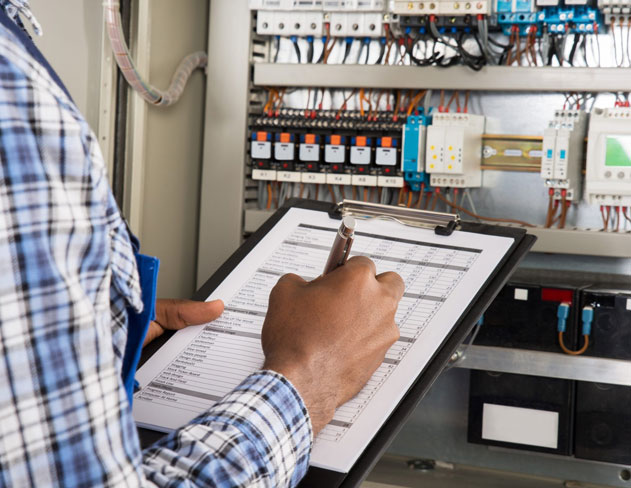Understanding Qualified Competent Electricians in EICR
EICRs are critical for ensuring electrical systems and equipment safety and compliance. But what exactly does it mean for the electrician conducting these assessments to be qualified and competent?
This article will explore the depth of these terms, shedding light on the importance of proper EICR certification, training, and expertise.
The Importance of Being Qualified and Competent in EICRs
Being qualified and competent in carrying out EICRs is vital. EICRs should only be conducted by electricians with the proper qualifications and who have demonstrated the necessary competence. Failure to meet these standards can have major legal and safety consequences.
At a minimum, electricians must hold specific certifications to be considered qualified. They must also possess the right blend of knowledge, skills and experience to carry out thorough, accurate EICRs. Both qualification and competence are essential for identifying potentially dangerous defects and non-compliances.
What Does ‘Qualified’ Mean in EICRs?
For an electrician to be deemed qualified in EICRs, they must hold certain credentials and have undergone the proper certification process. Qualification generally refers to meeting the standards outlined by governing bodies.
Specifically, qualified electricians will hold certification from organisations like NICEIC, NAPIT or Elecsa. The certification process validates the electrician’s training, knowledge and understanding of the latest regulations and testing methods. Certified electricians are listed on official registers after satisfying stringent requirements.
For instance, NICEIC certification involves intensive exams, audits and Checks carried out by the organisation. Only electricians who demonstrate full technical competence in inspection, testing and risk assessment will be certified to carry out EICRs. The qualifications ensure electricians have mastered EICR processes and standards.
What Does ‘Competent’ Mean in EICRs?
Being competent for EICR purposes relates to possessing the right skills, knowledge and experience to execute the process properly. Competence refers to demonstrated abilities, unlike qualification which focuses on credentials.
A competent electrician has undergone sufficient training to understand what an EICR involves, from visual inspections to detailed load testing. They’ve developed key skills like using testing equipment, recognising electrical defects, assessing risks, and producing accurate reports. Experienced electricians will have sharpened judgement around safety issues.
Electricians prove competence through training programs and assessments. Organisations like NICEIC, NAPIT and Elecsa require electricians to undergo rigorous training on EICR testing methods, standards and reporting. The training covers both theory and hands-on practice. Electricians must pass assessments to confirm their abilities.
The Intersection of Qualification and Competence in EICRs
Understanding Qualified & Competent Electricians In EICR. While related, being qualified and competent have distinct meanings in the context of EICRs. Qualification shows adherence to specific certification standards, while competence demonstrates hands-on abilities. Both are absolutely essential for safe, effective EICRs.
Qualification provides the foundation of knowledge and training upon which competence is built. The credentials prove that standardised regulations, methods and safety principles have been learned. Competence then sharpens this baseline understanding through regular inspections and assessments.
In practice, qualification and competence work in tandem. Certified electricians have satisfied the qualification requirements, but must continue honing practical skills through experience to be considered fully competent. Both initial learning and ongoing skill development are crucial.
At the intersection lies expertise – the pinnacle demonstration of qualification and competence. Expert electricians combine deep knowledge from certification with seasoned judgement from conducting hundreds of meticulous EICRs. They understand the principles cold and can adeptly apply them in complex real-world scenarios.
The bottom line is EICRs demand properly qualified and thoroughly competent electricians. One without the other puts safety and compliance at risk. Ongoing qualification maintenance plus competence growth equals electrical inspection excellence.
Choose a Qualified, Competent Electrician for EICRs
Follow these tips to ensure you select a properly qualified and competent professional:
Verify Up-to-Date Certifications
- The electrician should hold current certifications from organisations like NICEIC, Elecsa, and NAPIT. Ask to see proof of certification.
- Look for credentials specifically related to EICRs, not just general electrical work.
- Cross-check credentials against official certification registers to validate they are authentic and active.
Evaluate Hands-On EICR Experience
- Ask how many EICRs the electrician has performed and on what types of properties. More experience is better.
- Request references from past EICR clients and verify the quality of work.
- Inquire about ongoing EICR training to ensure up-to-date competence.
Understand Their EICR Process
- Discuss the specific procedures used for inspection, testing, analysis and reporting.
- Review expected timeframes and costs—avoid electricians with hidden fees.
- Confirm the process adheres to the latest EICR regulations and industry standards.
Review Insurance, Safety Protocols
- Verify the electrician has adequate liability insurance coverage.
- Ensure proper safety protocols will be followed during the inspection.
- Discuss your legal obligations as a property owner/manager.
Evaluate Communication and Professionalism
- Assess communication abilities and professional conduct.
- Request a clearly written agreement covering work details, terms and pricing.
- Discuss post-inspection support like repairs and follow-up assessments.
Performing due diligence allows you to hire a qualified, competent EICR professional you can trust. Understanding the factors that affect the cost of an EICR can help you make an informed decision when choosing an electrician
Conclusion: Understanding Qualified & Competent Electricians In EICR
In summary, being qualified and competent are vital prerequisites for electricians carrying out EICRs. Qualification ensures foundational knowledge, while competence develops skilled application. Both must be continually maintained and enhanced.
Expertise comes from overlapping layers of qualification and competence – certified principles combined with seasoned skills. Electrical safety hangs in the balance during every inspection. EICRs demand nothing less than electricians who are highly qualified and thoroughly competent.
The next time you require an EICR, remember to choose an electrician who can demonstrate up-to-date qualifications and well-honed competence. Your safety and peace of mind rely on it.

